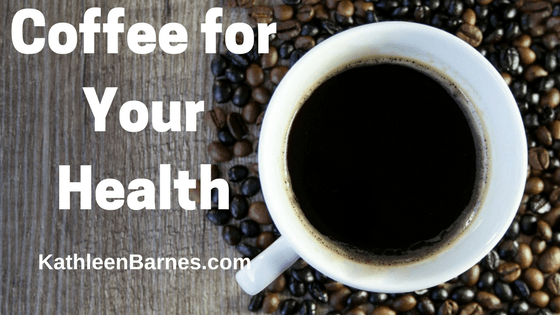I know, I just wrote about some of the health benefits of drinking coffee a few months back, but there is new research that is just too exciting to miss.
Long life: Coffee increases lifespan. I think it is fair and reasonable to make this unequivocal statement based on a recently released National Cancer Institute study of more than 400,000 volunteers between the ages of 50 and 71 who were free of major diseases when the study began in 1995.
The findings were impressive: Over the 13 years of the study, men who reported drinking two or three cups of coffee a day reduced their risk of death from any cause by 10% and women reduced their risk of mortality by 13%.
Reduced cancer risk: Recent studies show that just two cups of coffee per day reduce the risk of liver cancer by as much as 30%. There’s also good science affirming the protective effects of coffee against basal cell carcinoma (the most common kind of skin cancer), oral cancers, prostate cancer and recurrent breast cancer.
Preserve brain function: Researchers from the University of South Florida and the University of Miami tested the blood levels of caffeine in older adults with mild cognitive impairment, or the first glimmer of serious forgetfulness, a common precursor of Alzheimer’s disease.
When these subjects were re-evaluated them two to four years later, researchers found that those with little or no caffeine circulating in their bloodstreams were far more likely to have progressed to full-blown Alzheimer’s than those whose blood indicated they’d had about three cups’ worth of caffeine.
Prevent diabetes: Surprisingly, research shows that, for unknown reasons, heavy coffee drinkers (4-6 cups a day) have about 30% lower risk of Type 2 diabetes.
Lower your risk of heart disease: Just drinking two or three cups of coffee daily has been linked to a 20% lower risk of heart disease, but only a slightly reduced risk of death from heart disease.
If you want to increase the protection dramatically, drink tea instead Dutch researchers found that drinking more than six cups of tea day reduced the risk of heart disease by 36% and drinking just 3 to 6 cups a day reduced the risk of dying of heart disease by 45%.
Want more?
A 2010 study published the Annals of Family Medicine confirms another exciting use for coffee: It reduced the risk of carrying the deadly antibiotic resistant MRSA bacteria.
Good research also suggests you have a much better chance of evading Parkinson’s Disease and gallstones, too.
New studies are being released almost on a weekly basis, so stay tuned for more.
What’s in the latest health beverage?
So what’s in coffee that gives us these potent health benefits?
In part, it is the antioxidants, those compounds that keep cells healthy and stop the chronic disease process. We all suffer oxidative stress but by living and breathing. We can increase that negative impact on our cells by poor lifestyle choices, but we can make good choices of anti-oxidant rich foods to counteract the damage.
Fruits and vegetables are our primary sources of antioxidants and that extends to coffee (and chocolate!).
Coffee, whether caf or decaf, has a super-concentration of antioxidants, especially flavonoids that have verified beneficial effects on human health. In various studies, flavonoids have been demonstrated to possess anti-oxidant, anti-viral, anti-allergic, anti-platelet, anti-inflammatory and anti-tumor properties.
Coffee’s antioxidant compounds include caffeic acid, caffeine, the chlorogenic acids, eugenol, gamma-tocopherol, p-coumaric acid, scopoletin, isoeugenol, and tannic acid.
In fact, University of Scranton (PA) shows that coffee is the number one source of antioxidants in the American diet. I’m not sure that is really a good thing, since I’m an advocate of eating a wide range of fruits and vegetables for all of their nutrients, but it’s somehow comforting to know that coffee can certainly be a component of a healthy diet.
Just go easy on the sugar that we typically use to sweeten this naturally bitter beverage. I use Stevia and it tastes delicious.
The bottom line? Coffee protects your body. It’s not a guilty pleasure anymore. Enjoy!
The following post originally appears on this website in March of 2015. We felt it added value to this post.
Coffee: A Health Food
If you’ve been reading these posts for any period of time, you’ve probably figured out that I am an enthusiastic coffee drinker. I don’t drink tons of it—maybe two or three cups a day—but, where once I couldn’t stand the taste, I’ve now become an aficionado.
As it turns out, there is a growing body of scientific evidence confirming that coffee deserves a new status as a health food.
Heart health
A Korean study reported just this week confirmed that people who drink three to five cups of coffee have cleaner arteries than coffee teetotalers. Scans of the 25,000 Korean subjects’ arteries showed significantly less buildup of calcium deposits in the arteries of coffee drinkers. This study contradicts other research that says coffee, or rather the caffeine in coffee, can contribution to high blood pressure and elevated cholesterol.
More reasons to drink java
Here’s what other recent research is telling us about the health benefits of coffee:
- Reduce the risk of melanoma: Four cups a day can moderately reduce the risk of melanoma, an aggressive and sometimes deadly skin cancer. The same study showed coffee’s protective effects against basal cell carcinoma, the most common type of skin cancer.
- Reduce risk of type 2 diabetes: A 2012 study published in the American Journal of Clinical Nutrition showed that people who drank caffeinated and decaffeinated beverages, including coffee, had a 13% reduced risk of developing type 2 diabetes (of course, adding those heaping teaspoons of sugar could neutralize that benefit).
- Reduce the risk of Alzheimer’s: Scandinavian research shows that people who drank three to five cups of coffee a day in mid life reduced their risk of developing Alzheimer’s disease in later life by an impressive 65 percent.
- Reduce the risk of chronic liver disease: Those who drank small amounts of coffee (one or two cups per day) cut their risk of dying of chronic liver disease by half, according to a 19-year study of nearly 10,000 participants from the U.S. National Institutes of Diabetes, Digestive and Kidney Diseases.
- Slow the progression and recurrence of prostate cancer: Researchers at the Fred Hutchinson Cancer Research Center in Seattle found that men who were prostate cancer survivors and drank four or more cups of coffee a day had a 59% lower risk of the cancer returning.
- Prevent Parkinson’s disease: The Journal of the American Medical Association supported coffee for its health benefits as far back as 2000 with the publication of research from the Department of Veteran’s Affairs showing that people who drank coffee had a significantly lower risk of Parkinson’s disease. Researchers in this study and many others, attribute the health benefits to caffeine.
- Lower your risk of death from all causes: A National Institutes of Health 13-year study of 400,000 people showed that drinking four to five cups lowered the risk of death from any cause by 12%.
- Plus: we all know that coffee increases energy and alertness.
Know your limit
Most of the studies showed the greatest benefits at three to five cups a day. And remember a serving of coffee is generally considered to be five ounces, so we’re really talking here about 15 to 25 ounces. A little cream and sweetening (stevia is my preferred sweetener) don’t seem to be problematic, but watch out for those 22-ounce 1,000-calorie mocha grande with caramel drizzles.
As always, moderation is the watchword.
I’m so glad that coffee is joining my other favorites, dark chocolate and wine, as emerging health foods.







